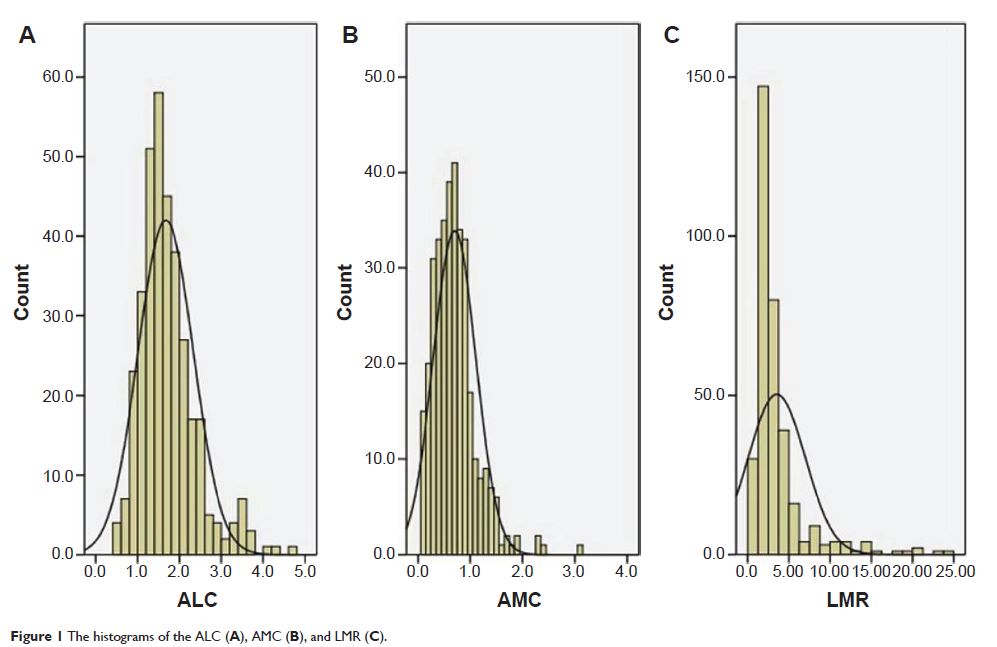108605
论文已发表
注册即可获取德孚的最新动态
IF 收录期刊
- 3.4 Breast Cancer (Dove Med Press)
- 3.2 Clin Epidemiol
- 2.6 Cancer Manag Res
- 2.9 Infect Drug Resist
- 3.7 Clin Interv Aging
- 5.1 Drug Des Dev Ther
- 3.1 Int J Chronic Obstr
- 6.6 Int J Nanomed
- 2.6 Int J Women's Health
- 2.9 Neuropsych Dis Treat
- 2.8 OncoTargets Ther
- 2.0 Patient Prefer Adher
- 2.2 Ther Clin Risk Manag
- 2.5 J Pain Res
- 3.0 Diabet Metab Synd Ob
- 3.2 Psychol Res Behav Ma
- 3.4 Nat Sci Sleep
- 1.8 Pharmgenomics Pers Med
- 2.0 Risk Manag Healthc Policy
- 4.1 J Inflamm Res
- 2.0 Int J Gen Med
- 3.4 J Hepatocell Carcinoma
- 3.0 J Asthma Allergy
- 2.2 Clin Cosmet Investig Dermatol
- 2.4 J Multidiscip Healthc

已发表论文
低术前淋巴细胞与单核细胞比率预测在食管鳞状细胞癌患者中的低癌症相关生存率
Authors Huang Y, Feng JF
Published Date January 2015 Volume 2015:8 Pages 137—145
DOI http://dx.doi.org/10.2147/OTT.S73794
Received 5 September 2014, Accepted 1 November 2014, Published 8 January 2015
Background: Recent studies have shown that the lymphocyte to monocyte ratio (LMR)
is a useful predictive factor in various cancers. However, the prognostic value
of LMR in patients with esophageal cancer has not been reported yet. The
purpose of the current study was to determine the prognostic role of LMR in
esophageal squamous cell carcinoma (ESCC).
Methods: Three-hundred and forty-eight patients who had undergone esophagectomy for ESCC were included. A receiver operating characteristic curve for survival prediction was plotted to verify the optimum cut-off point for LMR. Kaplan–Meier method was used to calculate the cancer-specific survival (CSS), the difference was assessed by the log-rank test. Univariate and multivariate analyses were performed to evaluate the prognostic factors.
Results: A receiver operating characteristic curve for survival prediction was plotted to verify the optimum cut-off point for LMR, which was 2.93. Patients with LMR ≤2.93 had a significantly worse 5-year CSS than patients with LMR >2.93 (21.2% versus 59.3%, P <0.001). For subgroup analysis, the predictive value of LMR was also significant in patients with T1-2 cancer (P =0.003), T3-4a (P <0.001), and patients with (P =0.044) or without (P <0.001) nodal metastasis. In addition, the predictive value of LMR was also significant stratified by absolute lymphocyte count (P <0.001) and absolute monocyte count (P <0.001). In multivariate analysis, LMR was a significant predictive factor of CSS (P =0.010).
Conclusion: LMR is still a predictive factor for long-term survival in patients with ESCC. We conclude that 2.93 may be the optimum cut-off point for LMR in predicting survival in ESCC patients.
Keywords: esophageal cancer, squamous cell carcinoma, prognostic factor, lymphocyte to monocyte ratio, cancer-specific survival
Methods: Three-hundred and forty-eight patients who had undergone esophagectomy for ESCC were included. A receiver operating characteristic curve for survival prediction was plotted to verify the optimum cut-off point for LMR. Kaplan–Meier method was used to calculate the cancer-specific survival (CSS), the difference was assessed by the log-rank test. Univariate and multivariate analyses were performed to evaluate the prognostic factors.
Results: A receiver operating characteristic curve for survival prediction was plotted to verify the optimum cut-off point for LMR, which was 2.93. Patients with LMR ≤2.93 had a significantly worse 5-year CSS than patients with LMR >2.93 (21.2% versus 59.3%, P <0.001). For subgroup analysis, the predictive value of LMR was also significant in patients with T1-2 cancer (P =0.003), T3-4a (P <0.001), and patients with (P =0.044) or without (P <0.001) nodal metastasis. In addition, the predictive value of LMR was also significant stratified by absolute lymphocyte count (P <0.001) and absolute monocyte count (P <0.001). In multivariate analysis, LMR was a significant predictive factor of CSS (P =0.010).
Conclusion: LMR is still a predictive factor for long-term survival in patients with ESCC. We conclude that 2.93 may be the optimum cut-off point for LMR in predicting survival in ESCC patients.
Keywords: esophageal cancer, squamous cell carcinoma, prognostic factor, lymphocyte to monocyte ratio, cancer-specific survival
